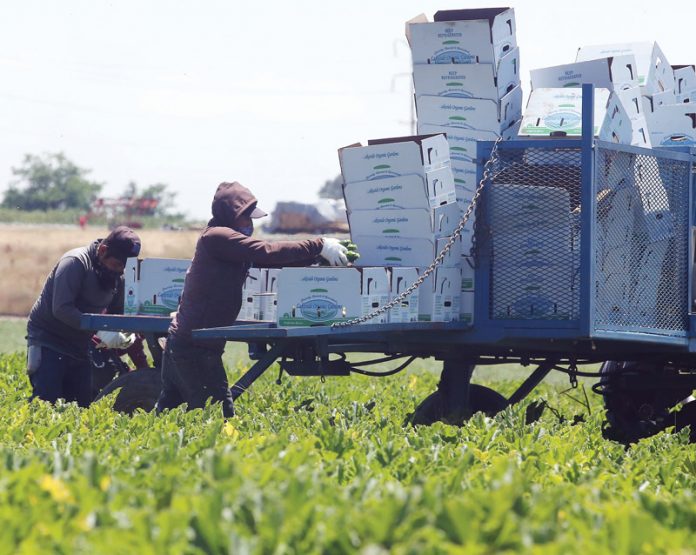
CENTRAL COAST—The Paycheck Protection Program helped save at least 17,000 agricultural jobs throughout the tri-county area, according to data released by the Small Business Administration on July 6.
The program, a part of the more than $2 trillion Coronavirus Aid, Relief and Economic Security (CARES) Act, dished out more than half a trillion dollars to millions of businesses impacted by Covid-19 restrictions, including more than 120 agricultural businesses in Monterey, San Benito and Santa Cruz counties and the southern reaches of Santa Clara County.
Two Central Coast giants, NorCal Harvesting, LLC in Salinas and Monterey Mushrooms Inc. in Watsonville, asked for and received loans ranging from $5-10 million.
Twenty-one other agricultural businesses in the region, including Scheid Vineyards California, Inc., Dobler and Sons and Lakeside Organic Gardens LLC, received loans of $2-5 million.
The SBA asked business owners seeking loans to provide some background information, including how many jobs the loan would help retain and the ethnicity of the owner. But some business owners left those fields unanswered. NorCal Harvesting, for example, said its loan—the largest amount a company could ask for—would preserve 500 jobs, while Royal Oaks’ R Montanez Farms LLC did not disclose how many jobs would be impacted with its $1-2 million loan.
Thirty-five businesses asked for loans of $1-2 million, the majority of which operate in the Salinas and Watsonville. Coastal Nursery, LLC on Watsonville’s Rancho Road was one such company. It said its loan would help preserve 113 jobs. In Salinas, a loan of that size helped Jorge Castro Farms save 500 jobs.
The majority (65) of local agricultural businesses asked for $350,000-1 million. Many of them were small farms such as Happy Boy Farms in Watsonville, Seamist Farms in Castroville, San Felipe Farms in Gilroy and El Campo Farms in Gonzales.
Santa Cruz County Agricultural Commissioner Juan Hidalgo said the impact of the PPP loan program varies from business to business. Because picking crops was deemed an essential job at the onset of the Covid-19 pandemic, businesses solely in charge of growing and harvesting were not hit as hard as others who process, store, transport and sell the crops. Many of those businesses were forced to shut down or limit their operations in the early days of the shelter-in-place restrictions.
“Most practices on the farm may not have been disrupted as much as you may have seen in other industries,” he said.
Hidalgo said it is too early to determine the overall effects of the pandemic, but he does expect more federal funds will be needed to help farmers such as growers who sell directly to local restaurants that will continue to be in flux as Covid-19 cases rise and fall.
“That’s going to continue to have an impact on the prices for some of our commodities and our growers’ ability to be able to sell what they would normally sell in a regular year,” Hidalgo said. “I think there will be an impact. I think growers are going to need some assistance from the federal government to help to recuperate some of what they lost this year, but it remains to be seen how big that impact is going to be.”
The program has distributed roughly $520 billion through about 4.9 million loans, according to the SBA. Roughly $130 billion still sat unclaimed, as of mid-July. Small-business owners have until Aug. 8 to apply for a PPP loan.
If at least 75% of the loan, according to the SBA, is used for payroll, it becomes “forgivable.”
To see the full list of recipients that received a loan of at least $150,000 visit the SBA website.
The SBA also released lists containing the approved loans of less than $150,000 for each state but did not disclose the names of the recipients.












